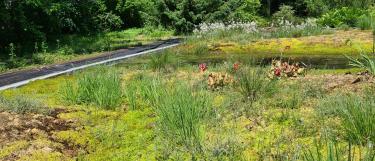
A raised bog in the middle of Neuenheimer Feld
Did you know that, for decades, there has been a hidden raised bog in the Botanical Garden of Heidelberg University which was originally modeled on the hillside bogs of the High Black Forest? Worldwide, raised bogs are able to store massive amounts of CO2 and to actively bind a large amount of carbon dioxide. When bogs dry out, carbon dioxide is respired and released into the atmosphere. Raised bogs therefore make a very important contribution to climate protection while harboring a unique biological diversity. After many decades, our raised bog had to be restored. Friends and supporters of the university made an important contribution to the implementation of the necessary measures.
WHAT WAS DONE TO PREVENT THE DRYING?
In order to prevent the drying and therefore increased CO2 emissions, the plant was resealed and provided with an inner core of water storage tanks. Besides, it is also supplied via a pipe which is directly connected to the rainwater cisterns of the Botanical Garden. Peat mosses were grown and are now supposed to rebuilt the bog body. But it is not only the water supply that has been optimized. The light situation, which is really important for raised bogs, could also be improved by cutting down some of the surrounding trees that were already damaged.
CONTRIBUTION TO THE PROTECTION OF BIODIVERSITY – HOW WAS IT POSSIBLE?
Raised bogs are an important habitat for endangered plants, animals, fungi and lichens. Most of the species that you will find in Heidelberg were collected by students while being on field trips. The raised bog in the Botanical Garden provides perfect conditions for rare plant species such as the carnivorous sundew and various cotton grasses. The royal fern, for example, which is extinct in the entire Odenwald except for one location in Heidelberg, also finds a retreat here at the edge of the garden. The Botanical Garden possesses descendants of these plants in order to be able to reintroduce them in suitable places, if possible.

We would hardly be able to realise our projects without any additional support. Especially donations from friends and supporters make a vital contribution. This is why I would like to thank all of those who support the Scientific Heritage Fund.
Prof Marcus Koch, Director of the Botanical Garden










